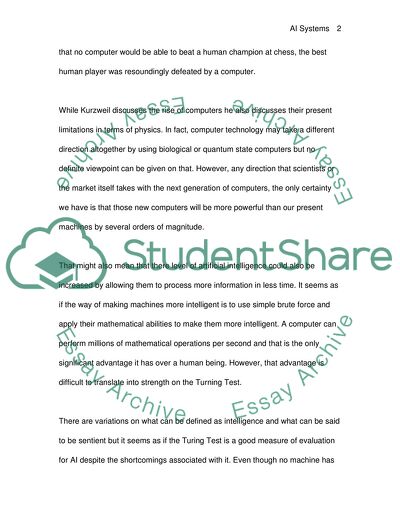
- Home
- Free Samples
- Premium Essays
- Editing Services
- Extra Tools
- Essay Writing Help
- About Us
- Studentshare
- Subjects
- Miscellaneous
- Discuss whether AI systems (either symbolic/sub-symbolic) could ever be more intelligent than we ourselves are You should consider the varying interpretations
Discuss whether AI systems (either symbolic/sub-symbolic) could ever be more intelligent than we ourselves are You should consider the varying interpretations - Essay Example

- Subject: Miscellaneous
- Type: Essay
- Level: Undergraduate
- Pages: 4 (1000 words)
- Downloads: 0
- Author: walterbenny
Extract of sample "Discuss whether AI systems (either symbolic/sub-symbolic) could ever be more intelligent than we ourselves are You should consider the varying interpretations"
Perhaps the most detailed, intelligent, hopeful and sometimes scary look at the future is presented by Ray Kurzweil’s The Age of Spiritual Machines (1999). His central focus is on machine intelligence and how it can be expected to evolve in the coming years. Kurzweil explains and shows how computational power has grown exponentially in the past few years. While it was expected that one time that no computer would be able to beat a human champion at chess, the best human player was resoundingly defeated by a computer.
While Kurzweil discusses the rise of computers he also discusses their present limitations in terms of physics. In fact, computer technology may take a different direction altogether by using biological or quantum state computers but no definite viewpoint can be given on that. However, any direction that scientists or the market itself takes with the next generation of computers, the only certainty we have is that those new computers will be more powerful than our present machines by several orders of magnitude.
That might also mean that there level of artificial intelligence could also be increased by allowing them to process more information in less time. It seems as if the way of making machines more intelligent is to use simple brute force and apply their mathematical abilities to make them more intelligent. A computer can perform millions of mathematical operations per second and that is the only significant advantage it has over a human being. However, that advantage is difficult to translate into strength on the Turning Test.
There are variations on what can be defined as intelligence and what can be said to be sentient but it seems as if the Turing Test is a good measure of evaluation for AI despite the shortcomings associated with it. Even though no machine has actually passed the Turing Test, machine intelligence is getting close to the level where AI will simply be able to pass as a human being by using its vastly
...Download file to see next pages Read MoreCHECK THESE SAMPLES OF Discuss whether AI systems (either symbolic/sub-symbolic) could ever be more intelligent than we ourselves are You should consider the varying interpretations
The Symbolic Significance of Marriage
Organizational culture is fundamentally about symbolic meaning and as such cannot be managed. Discuss
A Symbolic Look at Hillary Rodham Clinton
Connectionist Models and Symbolic Models
Symbolic Interactionism of George Herbert Mead
Symbolic Meaning in Hawthorns Writings
Symbolic Terrorism
Organizational Culture Is Fundamentally about Symbolic Meaning

- TERMS & CONDITIONS
- PRIVACY POLICY
- COOKIES POLICY